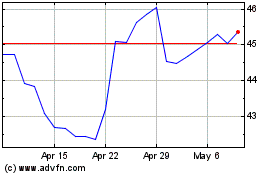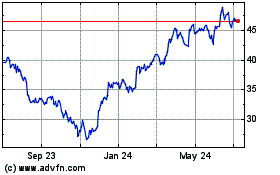GM Wants to Not Only Sell Cars, but Insure Them Too
November 18 2020 - 9:29AM
Dow Jones News
By Mike Colias
General Motors Co. is launching a car-insurance business based
on the idea its vehicles can remotely track drivers' behavior and
set insurance rates accordingly.
The Detroit-based auto maker will offer insurance plans branded
under its OnStar connected-car service, which comes installed on
all GM vehicles in North America, the company said Wednesday.
Customers who sign up agree to have their driving habits tracked,
and those who obey the speed limit, avoid sudden stops and practice
other good-driving behavior will be rewarded with cheaper rates, GM
said.
For much of its history, GM offered insurance to drivers, ending
the business when it unloaded its GMAC financial-services arm in
stages to raise cash around the time of its 2009 bankruptcy.
As more new cars are sold with built-in internet connections,
car companies are branching into services that aim to capitalize on
the growing reams of data generated by a vehicle's onboard
computers and sensors. They are using it for everything from
flagging possible mechanical trouble to allowing drivers to order
their morning coffee from the vehicle's multimedia touch
screen.
"Who knows more about your vehicle than the people who
manufactured it?" said Andrew Rose, president of GM's newly formed
OnStar Insurance Services.
Still, the efforts have been slow to catch on, in part because
some of those same services -- from navigation to parking -- are
easily available on drivers' smartphones, analysts say. GM believes
the data it can collect directly from its vehicles will deliver
more-precise information than insurance companies can now
access.
GM will begin a pilot this week for its own employees in Arizona
and plans to offer it nationwide later in 2021, Mr. Rose said. The
company will partner with a subsidiary of American Family Insurance
to underwrite the policies.
So-called usage-based insurance policies have emerged as one of
the more promising uses for connected-car data, analysts say.
Insurance companies for years have been offering drivers discounts
for good driving, relying on portable devices or smartphone apps to
keep tabs on the car's movements.
Some auto makers provide driving data to insurance companies to
help connect their owners to better insurance rates, though few if
any have gone a step further to offer their own plans. Ford Motor
Co. last month said it would give vehicle owners access to cheaper
insurance by beaming data from the car to a data exchange used by
many carriers to crunch rates.
The number of auto-insurance policies in North America that use
digitally-logged data from the car is expected to grow to nearly 50
million in 2023, from about 10.6 million at the end of 2018,
according to Berg Insight, a Sweden-based research firm.
GM in recent years has been exploring a way to return to the
insurance business by using data from its customers' vehicles, Mr.
Rose said.
To start, the company will set rates much like a typical
insurer, relying on traditional factors such as ZIP Code or the
amount of driving the policyholder does, Mr. Rose said. Eventually,
GM will more heavily weigh driving behavior and other variables in
determining rates. Eventually, it could even calculate the amount
of times safety features such as emergency braking are deployed, he
said.
Another example: GM could track whether tires are inflated
properly, which improves stopping distance and reduces the risk of
crashes, Mr. Rose said.
Running an insurance division should help GM prepare for a day
when it may offer a commercial driverless-car service, Mr. Rose
said. Future autonomous robot taxis have the potential to upend the
auto-insurance market by eliminating human-caused crashes, though
auto makers may need to insure their cars, he said.
Car companies are gravitating to services that rely on specific
information from the vehicle that third-party app developers aren't
able to easily replicate, says Brian Rhodes, a research and
analysis manager for connected cars at IHS Markit.
"The auto maker has more data at its fingertips that can tie
into a unique score and provide more value for insurance purposes,"
Mr. Rhodes said.
Write to Mike Colias at Mike.Colias@wsj.com
(END) Dow Jones Newswires
November 18, 2020 09:14 ET (14:14 GMT)
Copyright (c) 2020 Dow Jones & Company, Inc.
General Motors (NYSE:GM)
Historical Stock Chart
From Apr 2024 to May 2024

General Motors (NYSE:GM)
Historical Stock Chart
From May 2023 to May 2024
